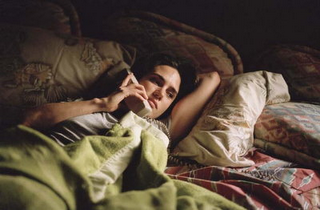Subtext with Roger Ebert

House of Sand and Fog:
“As for Kathy, misfortune and injury follow her. Even new love is bad luck. There are scenes involving her being taken back into her old house. And a crisis when the Behranis, whose family is threatened by this woman, simplify everything with one simple sentence: "We have a guest in the house." And a subtle subtext in the way Nadi Behrani (Shohreh Aghdashloo), Massoud's wife, treats the sad girl as a mother would, while hardly understanding a word she says.”
The Crow
“The scene in which Brandon Lee was accidentally shot is not in the film, but the fact of his death cannot help providing a melancholy subtext to everything he does on screen, and to all of his speeches about death and revenge. It is a sad irony that this film is not only the best thing he accomplished, but is actually more of a screen achievement than any of the films of his father, Bruce Lee.”
Angela’s Ashes:
“The result is a movie of great craft and wonderful images, lacking a heart. There must have been thousands of childhoods more or less like Frank McCourt's, and thousands of families with too many children, many of them dying young, while the father drank up dinner down at the pub and the mother threw herself on the mercy of the sniffy local charities. What made McCourt's autobiography special was expressed somehow beneath the very words as he used them: These experiences, wretched as they were, were not wasted on a mere victim, but somehow shaped him into the man capable of writing a fine book about them. There is in Angela's Ashes a certain lack of complaint, a sense in which even misery is treasured, as a soldier will describe his worst day of battle with the subtext: But I survived, and I love to tell the story, because it is the most interesting thing that has ever happened to me.”
Collateral:
“This is a long scene to come at the beginning of a thriller, but a good one, establishing two important characters. It is also good on its own terms, like a self-contained short film. It allows us to learn things about Max we could not possibly learn in the scenes to follow, and adds a subtext after the next customer into his cab is Tom Cruise.”
Rent:
“'Rent" is a stage musical that wants to be a movie musical. Many stage musicals, from "Oklahoma!" to "West Side Story," feel right at home on the screen. "Rent" on film is missing a crucial element of its life-support system: a live audience. The stage production surrounded the audience with the characters and the production. It lacked the song "We Are Family," but that was the subtext.”
Open Range:
“Boss grazes his cattle on the open range. His group includes Charley, the younger man Mose (Abraham Benrubi), big and bearded, and the kid Button (Diego Luna), who would sometimes rather play with the dog than do his work. They halt outside a town, Mose is sent in on an errand, and when he doesn't return the two men ride in after him and find him in jail. The town is run by a rancher named Baxter (Michael Gambon), whose dislike of free grazers is violent, and whose payroll includes a gang of hired thugs.
“When the two men free Mose and return to camp, they find the kid in bad shape. He needs to see a doctor. That means returning to the town, and they all know that to return to Baxter's domain is to risk death. "This may mean killing," Boss says. "I got no problem with that," says Charley. The subtext of the movie is that while Boss' way is best, when actual evil is encountered, Charley's way is required.”
The Station Agent:
“There was a documentary on cable the other night about little people, describing their lives in their own words, and its subtext seemed to be: Yes, I'm short. Get over it. I remember my face burning with shame early one morning when I was 6 years old and went with my father to where the circus was setting up. I gawked through a flap in the dining tent at the circus giant, and he scowled and said, "Can't you find anything else to stare at?" and I learned something that I never had to be taught again.
“The Station Agent makes it clear that too many people make it all the way to adulthood without manners enough to look at a little person without making a comment. It isn't necessarily a rude comment -- it's that any comment at all is rude. In a way, the whole movie builds up to a scene in a bar. A scene that makes it clear why Finbar does not enjoy going to bars. The bar contains a fair number of people so witless and cruel that they must point and laugh, as if Finbar has somehow chosen his height in order to invite their moronic behavior. Finally he climbs up on a table and shouts, "Here I am! Take a look!" And that is the moment you realize there is no good reason why Peter Dinklage could not play Braveheart. ”





















No comments:
Post a Comment